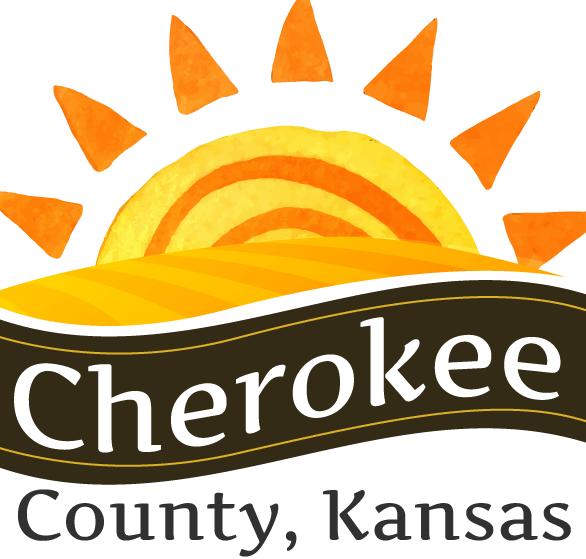Health Department Services
WIC Program
Immuniztions for VFC and limited private vaccine for adults
Disease Investigation
Early Intervention Screenings Walk Ins Welcome
• Blood Pressure, Blood Sugar and Hemoglobin checks
Blood Lead Testing Appointment Only
• Children 12mo thru 5yrs Blood Lead Level Testing and counseling
Tuberculosis Testing (TB) Mondays 8:30-11:30 am and 12:30-4:00 pm or Tuesday's by Appointment
- • TB Skin Testing
- • For more information on Tuberculosis visit http://www.kdheks.gov/tb/
No Sports Physicals
Communicable Diseases and Investigation and Reporting
Report communicable disease to Cherokee County Health Department during office hours at: 620-429-3087 Phone 620-429-3623 (FAX)
After hours reporting to KDHE: EPI Hotline 1-800-427-7317
Property Tax Assesment
| Type | Class | Assessment Ratio |
|---|---|---|
| Real Property | ||
| Residential | 0.115 | |
| Agricultural Land | 0.3 | |
| Vacant Land | 0.12 | |
| Non-Profit | 0.12 | |
| Public Utility | 0.33 | |
| Commercial, Industrial, and Agricultural Improvements | 0.25 | |
| Other Real Property | 0.3 | |
| Personal Property | ||
| Mobile Homes | 0.115 | |
| Mineral Leaseholds | 0.30/0.25 | |
| Utility Personal Property (Except Railroads) | 0.3 | |
| Motor Vehicles | 0.3 | |
| Commercial and Industrial Materials and Equipment | 0.25 | |
| Other Personal | 0.3 |
Real Estate
By definition, real estate is land and anything permanently affixed to it, including buildings.
The County Appraiser is responsible for discovering, listing, and valuing all property within Stanton County and must follow laws when meeting these responsibilities.
The first step in the appraisal process is to gather information concerning ownership, location, type of use, sales, building measurements, construction type, construction costs, and rental income.
Primary sources for this information are real property deeds, subdivision maps, building permits, local building contractors and office personnel who conduct on-site inspections to gather building contractors and interview owners. This information is stored by the County Appraiser, updated and maintained for current and future accepted appraisal process.
Each year the appraiser must review recent real estate sales and consider local economic conditions in order to maintain the most current value of property in the county.
Oil & Gas
The lease operator/taxpayer/tax representative is required to provide the information requested in Sections I-IV of the prescribed oil or gas rendition form and all other information necessary to figure the valuation of the property as determined by the Director of Property Valuation.
Failure to file a rendition on or before April 1 will result in penalties assessed to the operator.
The Prescribed Oil & Gas Rendition forms and Guide can be downloaded from the link below: Kansas Department of Revenue - Oil & Gas Forms and Information
Cherokee County Appraiser (2)
1/15/2026
LEGAL NOTICE
Results of the Market Study Analysis for Cherokee County for the Assessment Year 2026
January 1, 2026-Pursuant to K.S.A. 79-1460a.
A study of the residential and commercial real estate market, and vacant land in Cherokee County, indicated that there was an overall inflationary trend of 5%.
Values on specific properties may not follow the general trend because of changes in the property, correction of the descriptive information, specific neighborhood sales data, or adjustment and equalization of values based on sales of similar properties.
The Cherokee County Appraiser’s Office thanks you for the opportunity to serve our great county.
Sincerely,
DeLinda White, R.M.A.
Cherokee County Appraiser
To view property characteristics and values for all real property in Cherokee County: Real Estate Search (User: public - Password: public)
To file on-line Personal Property Renditions: On-line Personal Property Filing
Important Dates
Jan 1 |
Renditions mailed to Personal Property owners who are registered with County Appraiser's Office |
|---|---|
Mar 1 |
Change of Value Notices for Real Property mailed |
Mar 15 |
Deadline for filing Personal Property renditions |
Apr 1 |
Deadline for filing Informal Real Property Value / Classification Appeal |
May 1 |
Notices of Appraised Value mailed to personal property owners indicating current year appraised value |
May 15 |
Deadline to appeal current year Personal Property value and real property informal conferences end. |
Our office now does the addressing for the non-incorporated parts of Cherokee county. We also make maps of all kinds, including but not limited to school districts, property ownership ( by townships, quadrants, or the entire county), aerials etc.
Map sizes range from 8x11 up to 42 inches wide. Prices vary according to size and also if aerials are used.
Link to ORKA MAPS
Link to INTEGRITY MAPS
Here are some examples of maps we can make.
Kids Corner
Specially For Kids Grades K-5
Tornadoes: http://www.nws.noaa.gov/om/brochures/owlie-tornado.pdf
Lightning:http://www.nws.noaa.gov/om/brochures/owlie-lightning.pdf
Floods: http://www.nws.noaa.gov/om/brochures/owlie-floods.pdf
Winter Storms: http://www.nws.noaa.gov/om/brochures/owlie-winter.pdf
Kid's Ready: http://www.ready.gov/kids
Nasa Kids Club: http://www.nasa.gov/audience/forkids/kidsclub/flash/index.html
Topex/Poseidon Activities: http://www.tsgc.utexas.edu/topex/coloring/
Brain Pop: http://www.brainpop.com/
Coloring: http://www.nssl.noaa.gov/edu/bm/bm_main.html
Students Grades 6-12
Riprock: http://www.srh.noaa.gov/srh/jetstream/lightning/flashriprock.htm
Weather Lessons: http://www.nssl.noaa.gov/edu/lessons/
Severe Weather Primer: http://www.nssl.noaa.gov/primer/
Weather Questions: http://www.nssl.noaa.gov/news/stories/hazard.html
Applications, Licenses & Forms
Applications, Licenses, Forms & Documents

